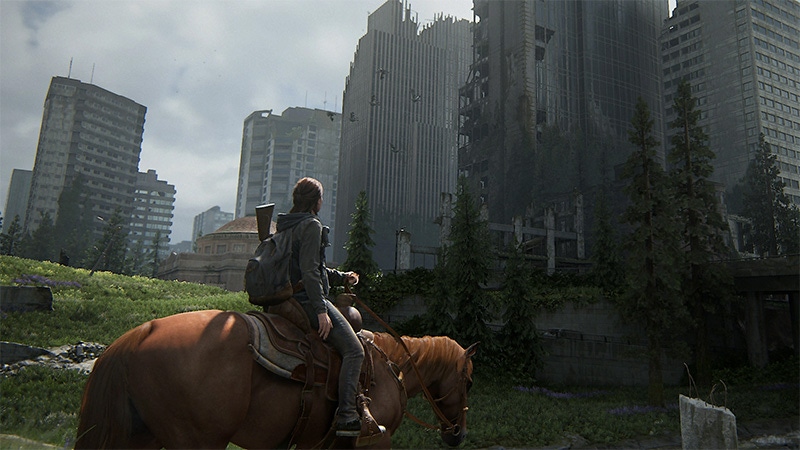Trending
Opinion: How will Project 2025 impact game developers?
The Heritage Foundation's manifesto for the possible next administration could do great harm to many, including large portions of the game development community.
Naughty Dog said shipping the game would have forced it to be come an entirely multiplayer-focused developer.

Development on a multiplayer spinoff of The Last of Us has come to an end. Naughty Dog shared the news in a blog posted on December 14, offering some additional transparency into why it will not be releasing the previously-announced game.
According to Naughty Dog, development on the unnamed standalone live service title (originally conceived as a successor to the Factions multiplayer mode in The Last of Us) was proceeding in a positive direction, but the studio was forced to reckon with the scope of the game as it prepared to enter full production on it.
"To release and support The Last of Us Online we’d have to put all our studio resources behind supporting post launch content for years to come, severely impacting development on future single-player games," it stated. "We had two paths in front of us: become a solely live service games studio or continue to focus on single-player narrative games that have defined Naughty Dog’s heritage."
This undoubtedly difficult decision comes seven months after Naughty Dog announced it was delaying the game, saying what was best for it was to "give it more time." Shortly after Naughty Dog released that statement, Bloomberg News reporter Jason Schreier reported that executives at Sony's recently-acquired studio Bungie had scrutinized the game and raised concerns about Naughty Dog's ability maintain support for it over the long run.
Sources speaking to Schreier indicated the game had been in development for at least four years. Naughty Dog's statement came with the caveat that "learnings and investments in technology from this game" would be "invaluable" for its other in-development projects.
It's been a strangely brutal year for the world of live service game development. What had once seemed to be a bountiful field to generate recurring revenue for developers seems to have withered somewhat, with some studios quickly shutting down games months after launch or key players in the space seeing steep declines in revenue.
These headwinds have landed at a bad time for Sony. In the wake of the COVID-19 pandemic, the company informed investors that it intended to make significant investments in live service games, hoping to have at least 10 such games online by 2026. Studios dedicated to VR Games and porting PC titles were enlisted in the effort and the studio spent $3.6 billion to acquire Bungie, the Destiny franchise, and its in-development extraction shooter Marathon.
Now half of those games have been delayed, Bungie has laid off staff following sharp declines in Destiny 2 revenue, and a major planned multiplayer expansion for one of the company's biggest video game franchises has been cancelled before it could even release.
Cancelling such a project is likely a crushing disappointment for the developers who worked on it, but Naughty Dog's description of the status quo around its development makes plenty of sense. If the studio had committed to fully supporting a multiplayer game it would have anchored its financial future to the consistent success of a single title—any dip in its performance could have left the company at risk of layoffs as steep as the ones enacted by Bungie.
Moving the entire studio into multiplayer game development could have cost Sony a key asset: a team of developers with a reliable track record for making prestigious single-player games. Investing in such properties has paid long-term financial dividends over the years, with The Last of Us most recently being adapted into a critically-acclaimed TV show on HBO.

Reimagining characters like Bill (played here by Nick Offerman) fueled critical acclaim for HBO's version of The Last of Us. Image via HBO.
Sony has also spent the last decade leveraging the platform exclusivity of said franchises to boost sales of PlayStation consoles, and recently began experimenting with calculated PC ports that an expand the marketing and revenue potential of existing games.
The future of recurrent revenue for Sony's single-player franchises may not be entirely doomed. Sony Santa Monica and Naughty Dog are both updating their most recent releases with new game modes inspired by the roguelike genre. Sony Santa Monica is releasing an expansion called "Valhalla" for God of War: Ragnarok as free downloadable content for the existing game, and The Last of Us Part II's new game mode "No Return" will be included with an upcoming "Remastered" version of the game optimized for PlayStation 5.
Neither expansion is designed with in-app spending but both game modes could generate player retention on two products not initially designed with daily replay value.
If Valhalla and No Return take off, Sony may follow in the footsteps of roguelike developers like Red Hook Studios and Motion Twin and develop additional content for these modes (possibly paid, but likely free) that can keep players hooked and continuing to purchase or re-purchase the game on different platforms.
You May Also Like